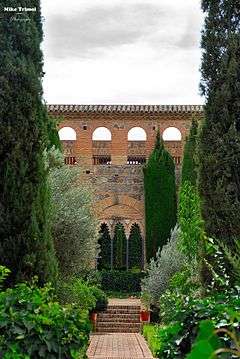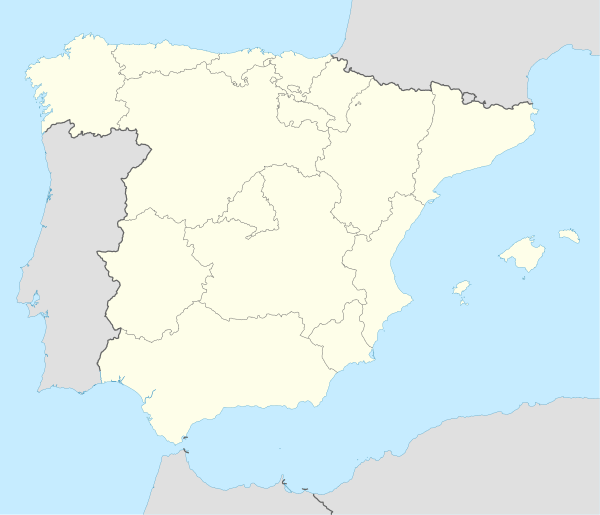Palacio de Galiana, Toledo
The Palacio de Galiana is a Mudéjar palace in Toledo, Spain, on the borders of the Tagus River. It was built on the site of an earlier summer villa and garden of Al-Mamun, the king of the Taifa of Toledo, in the thirteenth century by king Alfonso X of Castile.
| Palacio de Galiana | |
|---|---|
 Palacio de Galiana | |
 Location of Palacio de Galiana | |
| General information | |
| Architectural style | Mudéjar architectural style |
| Location | Toledo, Spain |
| Country | Spain |
| Coordinates | 39.8654°N 4.0051°W |
| Owner | Alphonse X de Castille |
Gardens
The garden area around the palace, called the 'Al-Munya al-Na‘ura' (the Water Wheel Orchard)[1] or 'Huerta del Rey' (the king's garden) included a botanical garden of the pharmacologist Ibn al-Wafid.[2] It was famous for its irrigation works, the ruins of which are still to be seen.
The garden was also, possibly, the location of a water clock, constructed by Al-Zarqali.[3]
20th century
From the 1950s onwards the Palacio de Galiana was restored and its present garden designed by the architects Manuel Gómez Moreno and Fernando Chueca Goitía under the auspices of its owner Carmen Marañón.[4]
See also
- Generalife
- Huerta de la Alcurnia
- Spanish gardens
Notes
- Antonio Almagro and Luis Ramón-Laca, "Introduction to the catalogue of Andalusian Gardens" (Toledo 7) "Archived copy". Archived from the original on 2009-02-11. Retrieved 2009-02-11.CS1 maint: archived copy as title (link) (retrieved 27 November 2008)
- The Economic History of Spain Under the Umayyads, 711-1031, p. 38: "Ibn al-Wafid specialised in medicine and botany and wrote important works and was employed by Mamun of Toledo to lay out his famous botanical garden near Toledo in the valley of the Tagus between the Palace called Galiana and the river."
- In Ahmed ibn Mohammed al-Makkari, The History of the Mohammedan Dynasties in Spain, (Routledge, 2002) reprinted from the first edition of 1840-43, Contributor Michael Brett writes (p. 384): "Los Palacios de Galiana (the palace of Galiana), where two tanks similar to those here described are still visible."
- Eduardo Mencos, Hidden Gardens of Spain, Frances Lincoln Ltd, 2004, ISBN 9780711219649, p. 67 (retrieved on November 27, 2008)
References
- Martínez Caviró, B., Mudéjar Toledano. Palacios y Conventos, Madrid, 1980
External links
- Thorough report and extensive references on the early history of the palace, photos and map at the bottom, on Middle East Gardens.com (retrieved on November 27, 2008)
- Photos of the Palacio de Galiana on Oronoz.com (retrieved on November 27, 2008)
- In Spanish: Jésus Téllez Rubio, "Dos Agrónomos Toledanos: Ibn Wâfid e Ibn Bassâl, y la Huerta del Rey" in: Tulaytula: Revista de la Asociación de Amigos del Toledo Islámico, ISSN 1575-653X, Nº. 4, 1999, pags. 49-58 (click on 'descargar' PDF) (retrieved on November 30, 2008)
- Julián Ramos Ramos, "Las almunias de la ciudad de Toledo", in: Tulaytula: Revista de la Asociación de Amigos del Toledo Islámico, ISSN 1575-653X, Nº. 3, 1998, pags. 51-76 (click on 'descargar' PDF)
- Wikimapia (retrieved on November 27, 2008)
- In Spanish, "La Historia de Fermosa" Abraham S. Marrache, Hebraica Ediciones 2009 https://web.archive.org/web/20130607013300/http://lahistoriadefermosa.com/ : Palacio de Galiana was the backdrop to the love affair that took place in 1179, between King Alfonso VIII of Castille and Fermosa, the young Jewess from Toledo.

